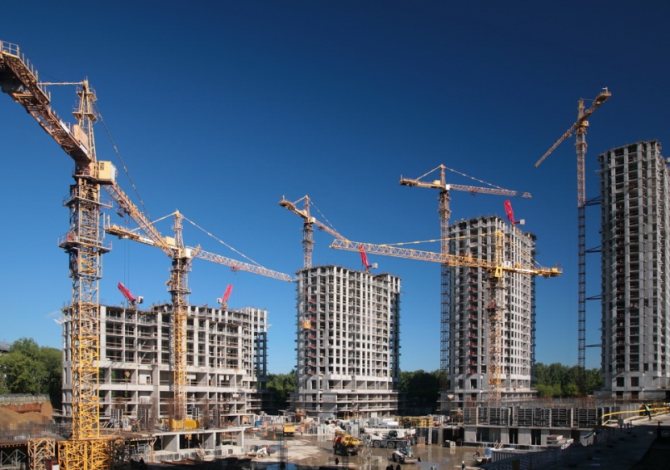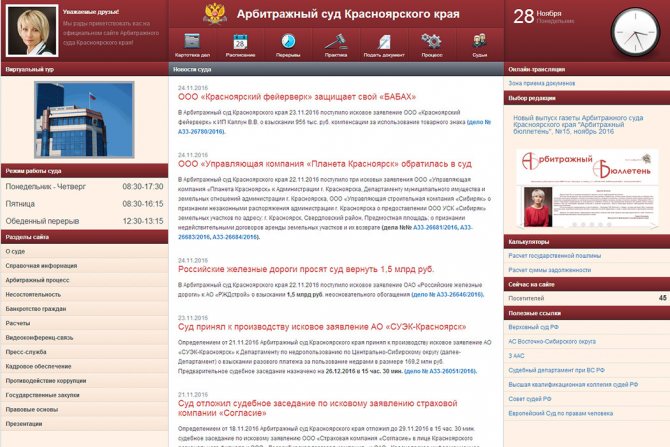We check the project declaration and information on the land plot
The developer must publish on his website:
- project declaration;
- information on the land plot on which construction is taking place.
All these documents need to be found, compared and checked with the agreement that you are asked to sign.
It often happens that the project declaration states one thing, but the contract states the developer’s obligations to a lesser extent. And, if this is revealed, then you can demand that the developer include additional conditions that were not previously agreed upon.
Construction permit
The document must be obtained from the organization that carries out the main control of construction in the region or region. It is important to note that in each sector its name may be different.
Official permission has a limited validity period. It is affixed with the date, signature of the responsible person and seal.
The specified data must fully correspond to those specified in the document. The authenticity of the procedure can be checked online on the official website of the responsible organization.
Project declaration
It is the main document for the potential owner, which presents important data about the future new building:
- What stages need to be overcome, construction deadlines and goals.
- Official permission to carry out construction activities.
- Address information.
- Technical characteristics of the premises, number of apartments.
- Common property.
- Availability of commercial premises allocated to a separate category.
- Beginning of service life.
- Insurance and possible risks.
- Price of the construction project.
- Which contractors are involved to fulfill the prescribed obligations.
- Type of financial security (whether the bank acts as a guarantor, insurance is issued).
- Availability of additional investments.
Important! The project declaration is published before the agreement for participation in shared construction is concluded.
State examination
It is an integral part of the project declaration, serving as confirmation of compliance with established norms and standards during the construction process, dictated by the approved regulations.
The event is carried out by the responsible body that supervises construction activities. Conducting a state examination is a mandatory procedure before construction begins.
Land documents
Registration of a land plot can be carried out in several ways: as property, sublease or long-term lease. Even less often in practice, there may be use in a gratuitous form, the limitation of which is specified for a certain period.
How legal the use of the territory is can be checked in a short time. You need to send a request to receive an extract from the Unified State Register.
It must include an owner with a certain type of encumbrance (if the land was leased). As a rule, most companies publish scans of documents on the official website, which reduces the time for drawing up and sending requests.
In case of absence, you can request copies of the following documents from the developer: a lease agreement, or an extract that must contain deadlines and official registration. The developer must act as a tenant.
Important! The lease period must not end before the date when the facility is planned to be put into operation. In order to avoid difficulties in the future, it is necessary to prolong his land rights.
If a sublease is issued, aspects of the possible transfer to the tenant and the actual terms of the concluded agreement are additionally studied.
We check the land plot allocated for construction in Rosreestr
To check the land plot (whether it is owned or leased by the developer), you need to order an extract from the Unified State Register of Real Estate. Also from the extract you will find out whether there are restrictions or encumbrances on this land plot. If the plot is owned, then this is a greater weight and a guarantee that the developer is building on his own land plot and this plot will not be taken away from him.
At this link you can see a sample extract from the Unified State Register of Real Estate for a land plot with DDU.
You can also go to the Public Cadastral Map and visually see the site.
Verify the land plot - order an extract from the Unified State Register of Real Estate
What is checked by the developer
There are a large number of construction organizations operating in the real estate market, actively advertising their projects. But advertising is just the engine of trade. A tool for attracting co-investors, providing financing for construction, selling finished products or services. Therefore, advertising has never been a guarantee of the quality of the product or the integrity and reliability of the seller.
There are several ways to check the developer when buying an apartment in shared construction.
Reputation in the market
Any commercial organization has an established business reputation in its market segment. Conscientious businessmen consider it an important asset and strive to make honest money and maintain a positive image of their business.
In our time of information accessibility, you can check the reputation and information about the developer in several ways:
- On specialized online forums, study the reviews of equity holders about this developer. At the same time, attention should be paid not to the emotions in them, but to specific facts of violation of legislation and contractual obligations.
- If this developer has completed houses, then ask its residents about any violations of the terms of their residential building permit.
- On the Internet, in the database of decisions of the Arbitration Court, check for open cases or decisions made with the participation of the developer as a defendant. Or bankruptcy proceedings have been initiated against him.
- On the official website of the Federal Bailiff Service, check the availability of enforcement proceedings against the construction organization as a debtor.
- Obtain an extract from the Unified State Register of Legal Entities on the official website of the tax office. This information is provided free of charge about all legal entities. From it you can find out about the date of registration of the legal entity, the status of liquidation, reorganization or exclusion from the register of legal entities.

His participation in self-regulatory organizations in the construction industry can say a lot about the reputation and reliability of a developer. For companies building residential buildings, this is a mandatory condition.
Project documentation
Having studied the reputation of the construction organization, you can begin to analyze the project documentation. This will allow us to understand the competence of the company’s management, its solvency, and the possibility of completing construction.
All project documentation must be posted on the developer’s website and provided to interested parties upon request at his offices.
Permission
The developer is required to obtain a building permit for this particular object, which is issued before the start of construction. In the permit you must pay attention to the following information:
- expiration date of the permit;
- presence of the date of issue, signature of an official and seal of the authorized local government body;
- name of the legal entity to which the permit was issued. It must be the same as the name of the developer.
Project declaration
The declaration must be posted on the website of the construction organization before the conclusion of the first equity participation agreement. This is the most interesting document for the future shareholder. It contains all the information about the house under construction:
- type of building, commercial name of the complex, by whom and when engineering surveys were carried out, various examinations;
- permission to build an apartment building;
- about the developer’s right to a plot of land under the house;
- long-term plans for landscaping;
- location of the construction site, characteristics of the building, total area, number of floors, material;
- deadlines for completing construction and obtaining permission to put into operation;
- on securing the obligations of the developer and on the bank for opening escrow accounts when participating in shared construction;
- agreements under which investors’ funds are raised (except for DDU).

State examination
The developer is obliged to obtain an expert opinion on the compliance of the design documentation before starting construction. Such examinations are carried out by supervisory and control structures of state authorities in the field of construction. The results of the examination are also posted on the construction company’s website.
Land documents
There are several options for registering a land plot under a house under construction - long-term lease, sublease or ownership. Very rarely there are cases of registration for free use for a certain period.
You can check information about rights to a plot by ordering an extract from the Unified State Register of Real Estate. It contains information about the owner and tenant. All information about land rights must be posted on the developer’s website. If it is not available, you can ask the builders for a copy of the contract, which will show the terms of the lease of the site.
Important! The lease period for the plot should not end earlier than the expected date of commissioning of the house, otherwise the shareholders will have big problems with the registration of the purchased apartments.
If there is a sublease for the development territory, it is necessary to analyze the legality of its transfer to the subtenant and the relationship between the validity periods of both agreements.
Find out if the developer has debts
The debts of a legal entity can be easily checked using public services. One of the best proven professional services for checking companies is the Kontur.Focus service. The service is paid, but the information received is worth it! Moreover, a one-time report on 1 company is not expensive.
Using this service, you can easily find out the most important “hidden” information about any company, which is collected in one window:
- data from the Unified State Register of Legal Entities/Unified State Register of Individual Entrepreneurs,
- arbitration cases,
- information about bankruptcy,
- won government contracts,
- debts of the company according to bailiffs,
- mass registration addresses and much more.
Thus, we can find out whether it has an authorized capital of 10,000 and no turnover, or whether it is a serious company with billions of dollars in turnover and has all the strength and capabilities to confidently build your home.
Independent verification of the accuracy of the information received
It is currently quite difficult in Russia to assess the reliability of a developer over the long term. However, it would be a good idea to obtain the following information:
- Information on the forums of shareholders. Information from other shareholders will definitely contain negativity. Therefore, you should be wary if the information looks too objective and there is a lot of it. Citizens rarely write positive reviews. But too much negativity should make you wary.
- Information about legal proceedings. In addition, you can look for rumors about the imminent bankruptcy of the company. Or looking for a crisis manager. An indirect sign of imminent bankruptcy is the presence of extremely profitable offers that do not correspond to the average price in a similar market. Information about imminent bankruptcy can be found on the website of the arbitration court.
- Data on review sites. This refers to special sites designed exclusively for consumer reviews. They contain subjective opinions of citizens on a specific service. Based on the overall picture, objective conclusions can be drawn.
From the data obtained, conclusions can be drawn about the principles of operation of the enterprise and the attitude towards shareholders. Perhaps at this stage information will come to light that will help you avoid cooperation with an unreliable partner.
We check whether the construction company is suing its contractors
This can be done on the website of the arbitration court. There you will see whether the company has legal proceedings with other contractors, how they are suing, and why they are suing.
There are also courts of general jurisdiction, where you can also find out by the name of the developer whether claims were made regarding construction time and deficiencies. You need to search in the courts at the place of state registration of the developer.
On court websites you can see not only current cases, but also decisions on completed cases on which decisions have been made.
All this analytical information needs to be collected, checked, and some kind of objective picture should emerge after that.
Make sure that bankruptcy proceedings have not been initiated against the developer
Data on bankrupt companies is posted on the website of the Arbitration Court of the Krasnoyarsk Territory. You need to go to the “Case File” section. In the window that opens, in the “Participant in the case” section, you need to enter the name of the construction company you are interested in, from the proposed options, select “AS of the Krasnoyarsk Territory”. You will see all the cases in which this construction company was a participant, and, accordingly, information about the bankruptcy procedure that has begun.

We collect information on previously constructed objects
If the developer is not building his first house, then it is important to check how he built other houses: what he built, how he built it:
- It will be useful to talk with the residents who bought these apartments;
- You can find on the Internet forums for participants in shared construction who previously participated in construction with this developer;
- Ask around what the quality was during construction, what quality the apartments were delivered to, what deficiencies there were, what to be prepared for, were the apartments delivered on time?
You may see that some shareholders previously sued this developer on previous projects due to construction deadlines or deficiencies.
Information about the new building
If you purchase an apartment under the DDU, it is worth checking not only the developer, but also the new building. It is recommended to study the sources of construction financing and the list of investors. It doesn’t hurt to evaluate the pace of construction and the developer’s ability to complete the construction on time.

Sources of financing
When constructing a property, it is possible to use several sources of financing:
- own funds;
- attracted from participants in shared construction;
- finances of co-investors and partners;
- borrowed funds and bank loans.
The construction of a new building using one’s own funds confirms the financial viability of the developer. This demonstrates its independence and makes the cost of apartments more attractive on the real estate market than its competitors.
Financing construction using borrowed bank funds is a common practice among developers. This is not yet a negative signal for future buyers. Developers are vetted by a credit institution before issuing loans. Many banks offer buyers of apartments from trusted builders more attractive mortgage terms.
Currently, there is a transition to project financing, which means refusing to attract funds from shareholders and working with your own and loan money.
Project delivery deadlines
The timing of commissioning and transfer of finished housing, corresponding to the project documents, is key information for equity holders. Possible penalties against the developer will depend on them.
Federal Law 214 provides specific requirements for the time period for transferring a new building to equity holders:
- The agreement for participation in shared construction must necessarily specify the deadline for the transfer of apartments. It must be the same for all shareholders.
- In case of violation of the deadlines for the transfer of real estate, the developer is charged a penalty in favor of the shareholder in the amount of 1/300 of the refinancing rate. If the shareholder is an individual, then the penalty is charged at double the rate.
There are situations when the developer does not have time to complete construction by the deadline for transferring apartments to shareholders. Then he is obliged to notify them two months before the expiration of the deadline about the postponement and offer to conclude an additional agreement on this.
Analyzing review sites
Naturally, you need to look at review sites about the construction company. Only, of course, not the reviews that are located on the company’s website. The site must be independent.
These can be reviews not only directly from shareholder clients, but also reviews from employees and former employees of the company as an employer. Because often an offended employee can leave more reliable information in his review. Not what the developer beautifully tells, but internal insider information about how things are going in the company. If suddenly you had a bad break up with some employee, he can tell a lot of the truth, as in reality.
Approximate date of commissioning
Construction completion and occupancy dates are key concepts in the construction industry. Turning to 214-FZ, the developer, if the established deadlines are violated, must be punished:
- The date suggesting the transfer of the construction project, which must be written down in the contract, must be the same for all owners. The only aspect that has the right to exist is the different deadlines for putting apartments into operation, depending on the section or entrance.
- If there is a violation of the published deadlines, the shareholder has every reason to receive a penalty. Its size is determined at a refinancing rate of 1/300. The price for the premises is taken as the basic equivalent. If the rights of shareholders were violated by the developer, the second party must pay a double penalty.
- If a construction company is obviously unable to meet the announced deadlines, two months before the expected completion it must notify all shareholders of the delay in putting the house into operation.
In addition, it is important to pre-execute an additional agreement on the basis of which subsequent work will be completed.
Please pay attention to the terms, subject of the contract and conditions
- When you check the contract, be sure to pay attention to the terms that are specified in the contract. It is very important to determine the deadline for handing over the keys (the deadline for the actual transfer of the apartment)
, and not the deadline for commissioning. Because this matters, since for violation of this deadline there is a penalty under Federal Law 214 “On participation in shared construction.” - Also take into account what obligations the developer bears , in what form he must transfer the finished apartment object. Often advertising campaigns and booklets say one thing, but the contract says something completely different. In this case, you can insist that advertising promises be included in the text of the contract.
- Be sure to check the subject of the contract : what exactly are you agreeing on for which apartment (area, layout, materials, etc.).
How to check the reliability of the developer during shared construction
Currently, in the territory of Moscow and the Moscow region, development is carried out by groups of companies (developers), whose goal is to maximally protect the business owner from possible risks, including possible fines and claims from contractors, equity holders, etc.
The main (parent) company, which is usually a well-known brand, opens a separate legal entity for the construction of each of the facilities, i.e. Each construction project has its own developer.
For example, the group, as a well-known brand in the construction market, sold the residential complex “Solar Systems -2”, the residential complex “Vidny Gorod”, the residential complex “Laikovo” and other residential complexes as a developer. This information was posted on their website and given in advertising. However, in fact, for the construction of each of the objects, separate legal entities were created, the developer of the residential complex "Solar Systems -2" was JSC "Continent Project", the developer of the residential complex "Vidny Gorod" was LLC "Vidny Gorod", the developer of the residential complex "Laikovo" was LLC “Ivastroy”, etc. It was these legal entities that were indicated in the DDU as developers and it was against them that shareholders made claims as part of the bankruptcy procedure that had begun at Urban Group.
As the developers themselves explain, the creation of separate legal entities for each construction project is a current practice that facilitates tax accounting for each construction project, separates financial flows for each project, etc. Shareholders, when purchasing an apartment in a new building, must clearly determine who is the developer under the share participation agreement, since it is the developer specified in the DDU who is responsible to the shareholder, and not the developer who, being an advertising brand, formally has nothing to do with the construction.
Thus, when purchasing housing from a developer, it is necessary to establish who is the developer under the DDU agreement and check the reliability of the actual developer. Information about the actual housing developer must be clarified with the developer, the housing seller, and the received details (name of the legal entity, OGRN, INN, location address, information about the general director) must be compared with the documents (DDU, constituent and permitting documentation).
Constituent documents of the developer
In accordance with Art. Art. 20 and 21 Federal Law No. 214 of December 30, 2004 “On participation in shared-equity construction of apartment buildings and other real estate” (as amended on July 29, 2018), the developer is obliged to provide the shareholder with the following documents for review:
- constituent documents of the developer (Charter, certificate of state registration, certificate of registration with the tax authority, extract from the Unified State Register of Legal Entities no older than 30 days);
- financial statements for the last three years and as of the last reporting date;
- auditor's report for the last year;
- investment contract;
- feasibility study of the construction project;
- project declaration;
- project documentation with the conclusion of the state examination;
- building permit;
- documents confirming the developer's rights to the land plot (certificate of ownership or lease agreement for the land plot, extract from the Unified State Register of Real Estate for the land plot no older than 30 days);
- agreement between the developer and the insurance company;
- sample agreement under which the sale of an apartment will be carried out (DDU, etc.).
The developer is obliged to provide the above documents upon the first request of the shareholder. The developer’s refusal to provide the specified documents with reference to trade secrets and other far-fetched reasons is illegal and should raise red flags. Developers whose documents are in perfect order not only do not refuse to present them at the request of the shareholder, but also post them in the public domain on the website for everyone to see. Having received the necessary documents from the developer, we carry out their legal analysis and risk assessment.
Check the details of the organization: TIN, OGRN, address of the organization's location, information about the general director, bank details specified in the Charter, certificates and extract from the Unified State Register of Legal Entities for their identity. Please note that the extract from the Unified State Register of Legal Entities must be received at the tax office no more than 30 days ago. If an extract from the Unified State Register of Legal Entities is older, then you can obtain an extract from the Unified State Register of Legal Entities from the tax office yourself.
Familiarize yourself with the procedure for concluding an agreement for the sale of real estate as provided in the developer's Charter. Determine who has the right on behalf of the developer to enter into purchase and sale agreements, DDU, etc., what is the term of office of the general director and whether it has expired, etc. Next, check the developer’s details with all the documents presented to you for review.
Financial condition of the developer
When studying the financial statements, pay attention to the amounts of profit, the amount of losses, the amounts of receivables and payables shown in the reports. Compare the actual assets of the developer, the amount of profit and receivables with the amount of losses and accounts payable, with the planned cost of construction of the property indicated in the project declaration. This comparison makes it possible to assess the amount of funds required to complete the construction of the facility and their availability or absence from the developer. Please note that the presence of significant losses and accounts payable may indicate that the developer does not have sufficient funds to carry out construction.
Developer's project declaration
In the project declaration, it is necessary to clarify information about the land plot on which construction is carried out, information about the real estate object being built, about the expected time frame for construction and commissioning of the real estate object, about the estimated cost of construction, information about the financial position of the developer, about possible financial risks and measures to voluntary insurance of these risks.
In the design documentation and in the examination conclusion, pay attention to architectural, functional-technological, structural and engineering solutions to ensure construction. If it is difficult to understand these documents, pay attention to the very fact of the existence of design documentation and state examination of design documentation, from the conclusions of which it should follow that the design documentation complies with construction, sanitary, fire, etc. rules and regulations.
Investment contract
After reading the investment contract, you can obtain information about the infrastructure and social facilities that the developer must build along with the property. Pay attention to all the developer’s obligations, terms and stages of their implementation, since only after their implementation the house will be put into operation and occupied.
If the developer has assumed a very large volume of obligations for the construction of infrastructure and social facilities, there is a risk of failure to fulfill them on time. Take into account the volume of investment obligations when analyzing the financial condition of the developer, its assets, the financial feasibility of constructing a real estate property and social infrastructure facilities. Information from the investment contract makes it possible to determine the number of residents in the building, based on the cost per square meter of housing and the number of apartments transferred free of charge to beneficiaries and those on the waiting list.
Construction permit
When studying a construction permit, please note that it was issued in the name of the developer, compare the details of the legal entity in whose name it was issued with the details specified in the constituent documents. Please pay attention to the correspondence of information about the land plot in the construction permit and in the documents for the land plot (certificate of ownership, lease agreement). The cadastral number of the land plot, its area, category of land, permitted use must match.
Documents confirming the developer's rights to the land plot (certificate of ownership or lease agreement for the land plot, extract from the Unified State Register of Real Estate for the land plot no older than 30 days). When studying the title documents for a land plot, it is necessary to find out who is the owner of the land plot, clarify the category of land and the permitted use of the land plot. The owner of the land must be either your developer or the lessor who has entered into a land lease agreement with your developer. Please pay attention to the rental period. The permitted use of land must indicate “permission for multi-apartment development, construction of a multi-storey residential building.” If the documents indicate a different permitted use of the land, then this is a certain risk for the shareholder, since in the future it will require the developer to re-register the purpose of the land.
Also, you need to take into account that the construction of a property, for example, in an environmental zone, may entail the inability to register ownership of the property.
In the extract from the Unified State Register for the land plot, as well as for the real estate property, if any, check for the presence of encumbrances (mortgage, pledge, etc.), check the information about the owner, with title and other documents. Please note that the receipt of the statement must be no more than 30 days old. Any person and any property can receive a current extract from the Unified State Register of Real Estate by contacting the MFC at the location of the land plot.
We check who signed the contract
It often happens like this: an agreement with you is signed by some commercial (financial) director of an organization, acting by proxy. Be sure to request a copy of the power of attorney, check its powers and the validity period of the power of attorney.
If the developer later claims in court that the contract was signed by a person who did not have the authority to do so, it will be almost impossible for him to do this. Because the practice of the courts says that if the consumer entered into an agreement in the company’s office, there is a seal of the developer and all the circumstances were clear from the situation, then it is recognized that the agreement was actually concluded with a legal entity. And the fact that the developer “slipped” an unauthorized person is an unscrupulous act of the developer himself. because the manager and owner of the company must be responsible for the security of the seal. If some unauthorized person has access to the press and the opportunity to conclude an agreement in the company’s office, it is the developer’s fault.
But all the same, it is better to play it safe and check your authority to sign the agreement in advance, so as not to go to court on this issue in the future.
We check the transfer documents
- First of all, you need to check whether the apartment has been paid in full or not, look at the supporting documents (receipts and payment orders).
- If the apartment is from a contractor, then the apartment is received for the work actually completed. That is, they must provide confirmation that this apartment has in fact been worked off and the offset reports have been closed. And these documents must come not only from the contractor, but also from the developer himself. that is, the contractor can draw you anything you want. It is important that the developer confirms this information. This information must be obtained from the developer’s office, contact them so that they confirm that the apartment was indeed transferred to the contractor and worked on by him, and there are no claims or disputes.











